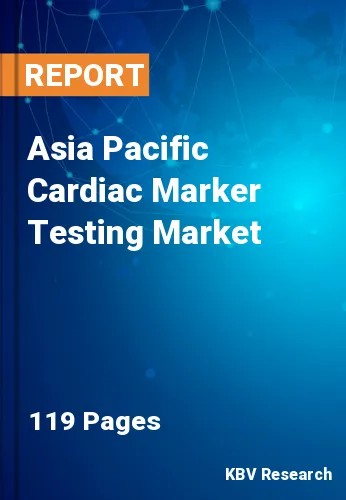The Asia Pacific Cardiac Marker Testing Market would witness market growth of 9.1% CAGR during the forecast period (2022-2028).
The measurement of cardiac biomarkers can aid in the diagnosis of a disease. Unlike cardiac imaging, which frequently confirms a diagnosis, simpler and less costly cardiac biomarker measures can inform a physician as to whether more complex or invasive procedures are necessary. In many instances, medical societies encourage physicians to use biomarker measurements as an initial screening method, particularly for patients with a low risk of cardiac mortality.
Numerous acute cardiac marker IVD products are designed for unconventional markets, such as hospital emergency rooms, as opposed to traditional hospital or clinical laboratory settings. Intense competition exists in the development and growth of cardiac marker diagnostic products into new markets. Recently, other potential cardiac markers have been identified as a result of the purposeful loss of myocardial via alcohol septal ablation.
Patients with acute myocardial infarction (MI) and those with SCAD are often distinguished by blood levels of cardiac markers of myocardial necrosis. However, circulating indicators of myocyte injury have recently been identified in patients with SCAD and have been proven to have a graded connection with the later risk for cardiovascular mortality as well as heart failure due to more sensitive cardiac troponin assays.
The considerable senior population in the region is one of the major factors driving the Asia Pacific's market expansion. China's elderly population is ageing faster than the rest of the world. The number of people over 65 increased from 42 million in 1953 to 72 million in 1978. Urban areas experience a faster increase in the elderly population than rural ones. China's elderly population is expected to increase to 11% by the end of the century and 20% by 2025.
The China market dominated the Asia Pacific Cardiac Marker Testing Market by Country in 2021, and would continue to be a dominant market till 2028; thereby, achieving a market value of $665.8 million by 2028.The Japan market is estimated to grow a CAGR of 8.4% during (2022 - 2028). Additionally, The India market would experience a CAGR of 9.8% during (2022 - 2028).
Based on Disease, the market is segmented into Myocardial Infarction, Congestive Heart Failure, Atherosclerosis, Acute Coronary Syndrome and Ischemia. Based on End User, the market is segmented into Laboratory Testing Facilities, Point-of-Care Testing Facilities and Academic Institutions. Based on Product, the market is segmented into Reagents & Kits and Instruments. Based on Biomarker Type, the market is segmented into Troponin I & T, Creatine kinase-MB(CK-MB), Natriuretic peptide (Bnp Or Nt-Probnp), Myoglobin, High-sensitivity C-reactive protein(hs-CRP) and Others. Based on countries, the market is segmented into China, Japan, India, South Korea, Singapore, Malaysia, and Rest of Asia Pacific.
Free Valuable Insights: The Worldwide Cardiac Marker Testing Market is Projected to reach USD 8.1 Billion by 2028, at a CAGR of 8.3%
The market research report covers the analysis of key stake holders of the market. Key companies profiled in the report include F. Hoffmann-La Roche Ltd., Abbott Laboratories, Danaher Corporation, Siemens Healthineers AG (Siemens AG), PerkinElmer, Inc., BioMérieux S.A., Becton, Dickinson and Company, Bio-Rad Laboratories, Inc., Thermo Fisher Scientific, Inc., and DiaSorin S.p.A.
By Disease
By End User
By Product
By Biomarker Type
By Country
Our team of dedicated experts can provide you with attractive expansion opportunities for your business.

